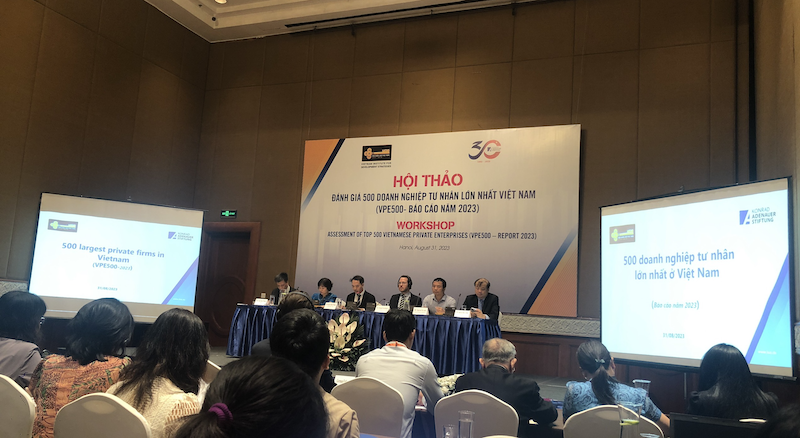Forward-looking policies needed to support Vietnamese private firms
The research group calls for analysis of competitive capabilities of the VPE500.
The role of Vietnam's 500 largest private enterprises (VPE500) in meeting foreign market demand should be thoroughly assessed to formulate supportive policies for their development, economic experts have suggested.
| Delegates attend the workshop. Photo: Phi Nhat |
At the workshop on the assessment of Vietnam's top 500 private enterprises (VPE500 - Report 2023) held on August 31, Nguyen Tu Anh, Director of the General Economic Department under the Party's Economic Commission, stressed the importance of conducting surveys on these enterprises to understand their challenges and overseas expansion plans. The results of the survey would ultimately provide guidance for these enterprises and contribute to the country's economic development.
Echoing Tu Anh, Economist Le Dang Doanh recommended that the VPE500 report group should analyze the competitiveness of VPE500 enterprises in international integration.
"The analysis would help the government design supportive policies for this group," he stressed.
At the event, the research group took note of the economic experts' suggestions for future reports. This is the second report conducted by the Vietnam Institute for Development Strategies (VIDS) under the Ministry of Planning and Investment (MPI) and the Konrad-Adenauer-Stiftung Vietnam (KAS).
KAS Resident Representative Florian Constantin Feyerabend said that within the private sector, the largest domestic enterprises can be seen as market leaders with significant influence on the economy. The performance of these enterprises reflects the overall health of the economy. Globally, it is quite common to use the performance of large enterprises as an indicator to assess the efficiency of an industry and the health of the economy.
By developing the VPE500, KAS and VIDS aim to provide an additional effective index for macroeconomic management in Vietnam. This report analyzes how the largest private enterprises in Vietnam have changed in this context, their resilience, and whether they are the pillars for the development of private enterprises in general.
Tran Toan Thang, head of the VIDS International Issues Division said the VPE500 is dominated by service sector companies, with 11 leading businesses operating in finance, banking, insurance, and trade.
The industrial processing and manufacturing sector in the VPE500 list has experienced significant fluctuations, once accounting for 49% of the VPE500 list (in 2000), but now this percentage has shrunk.
In contrast, real estate companies have a relatively high representation in the VPE500 list, but the number of companies operating in the construction sector has been reduced by the impact caused by Covid-19.
Although present in 53 out of 63 provinces and cities, VPE500 enterprises were mainly concentrated in the Red River Delta and the Southeast region, accounting for about 75% of the total and showing a slight upward trend.
Overall, the formation of the VPE500 is based on infrastructure, resources, and local market advantages. The VPE500 spans all 21 major industries, with the highest concentration in industrial processing and manufacturing, trade, and construction.
Compared to Covid-19 and before, there were significant changes in the number of companies entering and leaving the VPE500 list. In 2020, as many as 97 out of 500 enterprises (19.4%) exited the VPE500 from that in 2019.
Thang suggested that future supportive policies need to be sustainably improved to help enterprises enter the market and grow. In particular, policies can encourage large enterprises to invest in productivity improvement for sustainable growth.
"In addition, it is necessary to enhance the ability of enterprises to join the production networks, supply chains, and the global value chain. Efforts should also be made to encourage each city and province to build their own leading private enterprises based on local advantages, which would eventually expand their operations nationwide," he stressed.
As of December 31, 2021, Vietnam had 694,200 domestic private enterprises (VPEs), accounting for 96.6% of the total number of active businesses, employing 58.1% of the labor force, owning 59.3% of the assets, and generating 57.8% of the net income of the business sector. The majority of VPEs are small and medium-sized enterprises established after the Doi moi (renewal period). By the end of 2021, only 0.22% of VPEs had more than 500 employees, which is below the overall rate of 0.52%, and also 8.3% lower than FDI enterprises and 19.5% lower than SOEs. |












